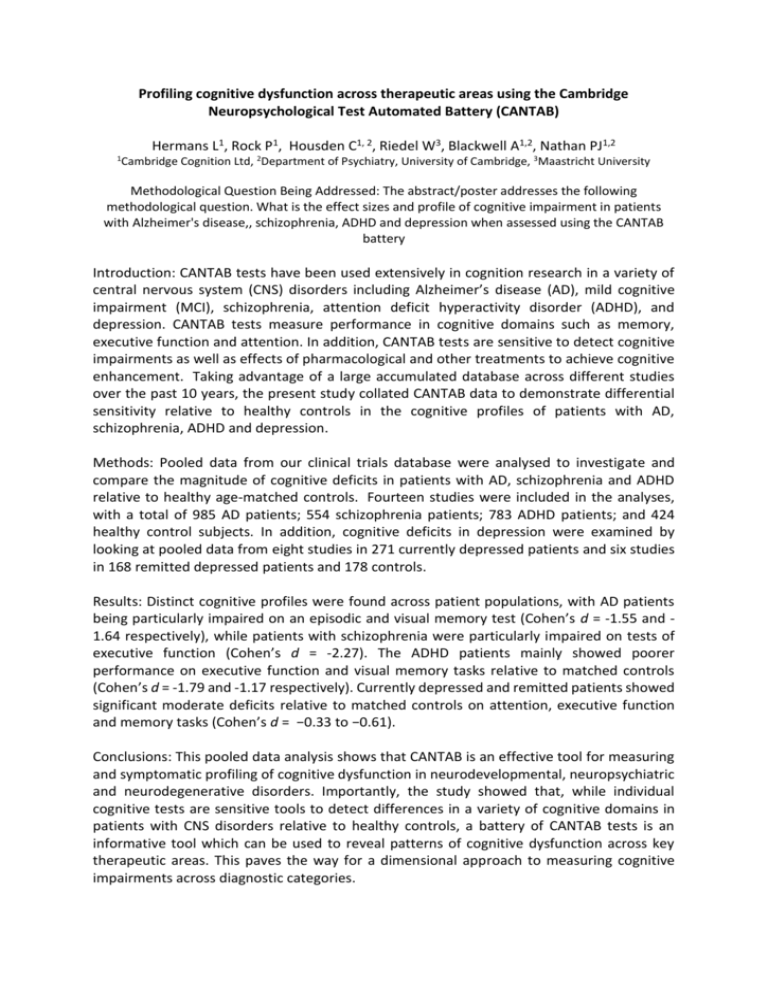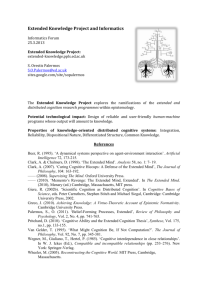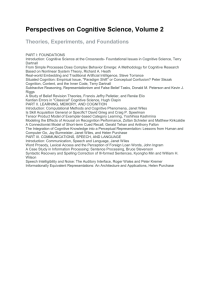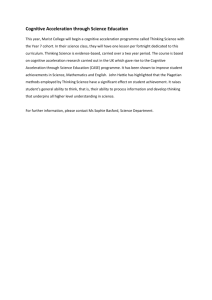Hermans-abstract
advertisement

Profiling cognitive dysfunction across therapeutic areas using the Cambridge Neuropsychological Test Automated Battery (CANTAB) Hermans L1, Rock P1, Housden C1, 2, Riedel W3, Blackwell A1,2, Nathan PJ1,2 1 Cambridge Cognition Ltd, 2Department of Psychiatry, University of Cambridge, 3Maastricht University Methodological Question Being Addressed: The abstract/poster addresses the following methodological question. What is the effect sizes and profile of cognitive impairment in patients with Alzheimer's disease,, schizophrenia, ADHD and depression when assessed using the CANTAB battery Introduction: CANTAB tests have been used extensively in cognition research in a variety of central nervous system (CNS) disorders including Alzheimer’s disease (AD), mild cognitive impairment (MCI), schizophrenia, attention deficit hyperactivity disorder (ADHD), and depression. CANTAB tests measure performance in cognitive domains such as memory, executive function and attention. In addition, CANTAB tests are sensitive to detect cognitive impairments as well as effects of pharmacological and other treatments to achieve cognitive enhancement. Taking advantage of a large accumulated database across different studies over the past 10 years, the present study collated CANTAB data to demonstrate differential sensitivity relative to healthy controls in the cognitive profiles of patients with AD, schizophrenia, ADHD and depression. Methods: Pooled data from our clinical trials database were analysed to investigate and compare the magnitude of cognitive deficits in patients with AD, schizophrenia and ADHD relative to healthy age-matched controls. Fourteen studies were included in the analyses, with a total of 985 AD patients; 554 schizophrenia patients; 783 ADHD patients; and 424 healthy control subjects. In addition, cognitive deficits in depression were examined by looking at pooled data from eight studies in 271 currently depressed patients and six studies in 168 remitted depressed patients and 178 controls. Results: Distinct cognitive profiles were found across patient populations, with AD patients being particularly impaired on an episodic and visual memory test (Cohen’s d = -1.55 and 1.64 respectively), while patients with schizophrenia were particularly impaired on tests of executive function (Cohen’s d = -2.27). The ADHD patients mainly showed poorer performance on executive function and visual memory tasks relative to matched controls (Cohen’s d = -1.79 and -1.17 respectively). Currently depressed and remitted patients showed significant moderate deficits relative to matched controls on attention, executive function and memory tasks (Cohen’s d = −0.33 to −0.61). Conclusions: This pooled data analysis shows that CANTAB is an effective tool for measuring and symptomatic profiling of cognitive dysfunction in neurodevelopmental, neuropsychiatric and neurodegenerative disorders. Importantly, the study showed that, while individual cognitive tests are sensitive tools to detect differences in a variety of cognitive domains in patients with CNS disorders relative to healthy controls, a battery of CANTAB tests is an informative tool which can be used to reveal patterns of cognitive dysfunction across key therapeutic areas. This paves the way for a dimensional approach to measuring cognitive impairments across diagnostic categories. LH, CH, AD and PN are full-time employees of Cambridge Cognition.





